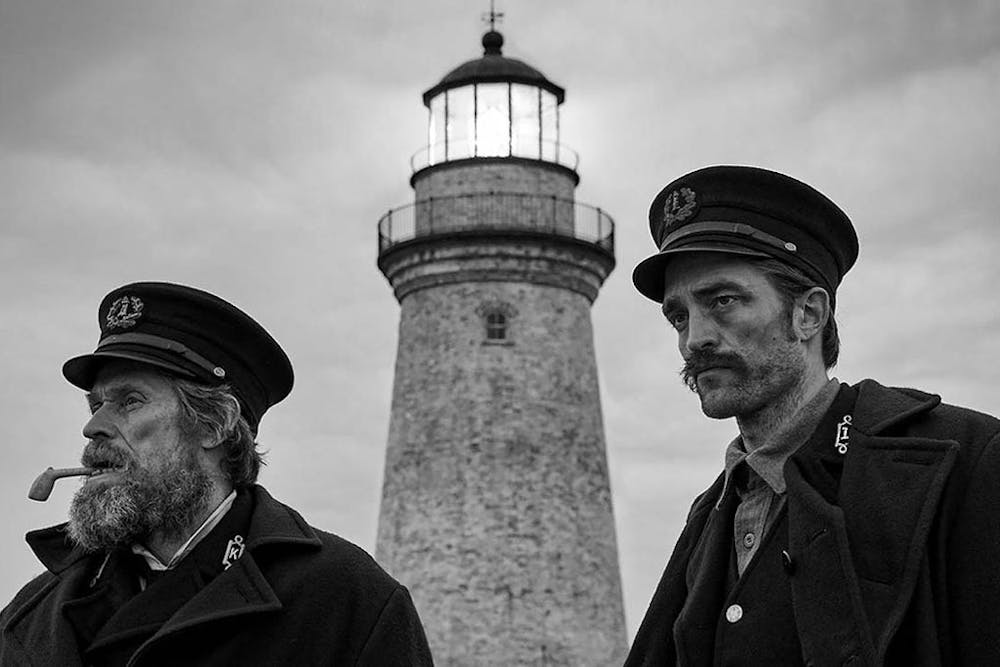In retrospect, Ephraim Winslow shouldn’t have spilled his beans. But, if that were the case, the world would be without a whirlwind cinematic portrayal of a working-class bromance and unraveling conceptions of reality that promises to be an awards circuit darling.
Watching someone else’s descent into madness, after all, is a schadenfreude that’s tough to resist.
"The Lighthouse," director Robert Eggers’ second feature film, premiered in the United States on Oct. 18 and is a virtuosic portrait of the limits of psychological endurance in the vice grip of hopelessness.
Set in the late 19th century, the film toys with the notion of empiricism through a black-and-white, Lord of the Flies-esque lens in micro-scale. Willem Dafoe and Robert Pattinson portray two men stationed at a lighthouse on a remote, storm-battered island where a four-week assignment goes awry.
The story itself is a slow burn, a single long crescendo that finally erupts in a cascade of hallucinogenic episodes.
The plot follows the duo’s daily machinations as they toil to keep the life-preserving light on and become more familiar with each other (with the assistance of massive quantities of grain alcohol). Eventually, the two become disillusioned with the other’s trustworthiness to the point of break.
Dafoe’s portrayal of Thomas Wake — a coarse, prototypical elderly man of the sea — is a towering performance that provides a foil to Pattinson’s at-first introverted Winslow.
The film’s namesake lighthouse stands as a specter of mystic allure over the story arc. The beauty contained inside of the lighthouse’s Fresnel lens, which the BBC called "the invention that saved a million ships," is never explicitly stated.The enigma of the beacon summons comparisons to the contents of Marsellus Wallace’s briefcase in Quentin Tarantino’s "Pulp Fiction."
Shot in black and white 35 mm film, the desolate setting is a character in itself. Periodic foghorn blasts serve a dual role as a reminder of the characters’ isolation and a metronome pacing the increasingly manic duo’s interactions.
The measured tempo of "The Lighthouse" does no disservice to the script’s progression. One begins to wonder about an hour in if Wake’s irascibility and crude mannerisms mask a tortured literary genius: Moments after an agonizingly long dialogue between Wake and Winslow where the two simply trade questions of “what,” Wake launches into a lettered tirade of mythic proportions.
Eggers co-wrote the script alongside his brother Max, and it becomes clear around the halfway mark the two were keenly aware of the film’s appeal to the actors and critics who dish out awards. In one of the film’s few shortcomings, the exploration of Winslow’s feverish dreamworld is cut short in an apparent effort to keep the plot’s linear fluidity.
Is it a horror film, like Eggers’ acclaimed directorial debut "The Witch?" It’s difficult to ascertain. Comedic bursts, like Wake’s indignation over Winslow’s summary abuse of his lobster cooking abilities, render such attempts at genre-defining useless.
Get content from The Daily Lobo delivered to your inbox
The days of Pattinson portraying sulking, pubescent archetypes are a distant memory. The income from the Twilight series — which the 33-year old Englishman has openly disdained — assuring him financial security for the rest of his life, Pattinson has been relentless in his pursuit of scripts that take his work as far as possible from the MTV Movie Awards.
In short, the Twilight saga’s merciful closure in 2012 with "Breaking Dawn: Part 2" gave Pattinson space in which to establish himself as a serious actor. Stints working with David Cronenberg, Werner Herzog and a raft of independent filmmakers have lent his career credibility after most inauspicious beginnings, and "The Lighthouse" cements his status as one of the most versatile actors of his generation.
Though Dafoe has the more complete performance — and make no mistake, his is the role that dominates the film with sheer force of personality — it is Pattinson’s transformation from introverted subordinate to unhinged provocateur that drives the plot into interstellar acid-dream overdrive.
Is "The Lighthouse" two hours long? A week? The official running time is 110 minutes, but walking out of the theater after watching it gives a jarring sensation that the film’s narrative accomplished stretching time itself. In a sign of Eggers’ understanding of the power wielded by allegorical narratives, the viewer is left with more questions than answers: What did Winslow see in the Fresnel lens? How long were they on that rock?
Ultimately, "The Lighthouse" is a triumph: Meticulous production design, a script polished to a period-accurate sheen and powerhouse performances from the cast of two lend the film an emotional weight that’s impossible to convey in an 800-word review.
Showtimes and locations are available at fine internet search engines everywhere. Bring your own beans.
Andrew Gunn is a senior reporter and copy chief at the Daily Lobo. He can be reached at news@dailylobo.com or on Twitter @agunnwrites






